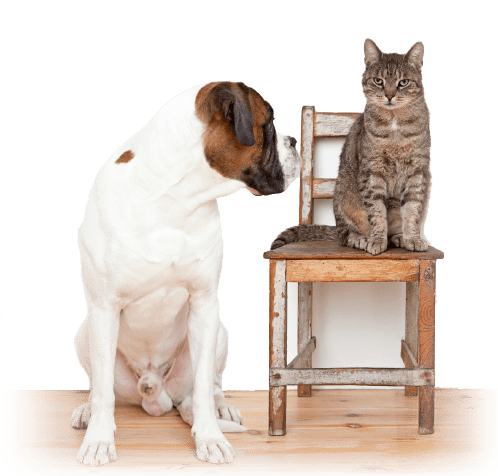Congestive Heart Failure – What is it and What to Expect
What is Congestive Heart Failure (CHF) in Dogs & Cats?
- CHF occurs when heart disease in dogs or cats is so severe that the cardiovascular system is no longer able to maintain its functions.
- Normally, blood returns from the body to the right side of the heart, is pumped to the lungs to be oxygenated, returns to the left side of the heart, and is finally pumped to the body again. A basement sump pump is analogous to the heart’s function. If the basement sump pump fails to pump water away from the foundation during a rainstorm, the basement floods. When the left side of the heart fails as a pump, the lungs begin to “flood” and when the right side of the heart fails, the abdominal and/or chest cavities “flood.”
How serious is CHF?
- A common misconception is that congestive heart failure in dogs and cats is an end-of-life disease process.
- Fortunately, while the long-term prognosis for most cardiac diseases resulting in heart failure is guarded, most dogs or cats with congestive heart failure will live many months to even years on medical therapy while still maintaining a good quality of life.
How is it treated?
- CHF is a medically managed condition. As your pet’s heart disease progresses and relapses or CHF occurs, we will continue to work with you and your primary care veterinarian to adjust medical therapy in an effort to regain control of clinical signs.
- Congestive heart failure is usually managed by a three level approach:
- Decrease the heart’s preload (volume it must pump) so that it can function more efficiently.
- Diuretics such as Lasix (furosemide), Spironolactone, Hydrochlorothiazide (HCTZ)
- Decrease the heart’s afterload (resistance which it has to pump out against) by dilating the arteries in the body and lungs
- Vasodilators
- ACE inhibitors:(Enalapril, Benazapril, or Lisinopril)
- Norvasc (Amplodipine)
- Hydralazine
- Vasodilators
- Increase the heart’s force of contractions: by supporting and improving the overall strength of the heart muscle more blood can be pumped out to the rest of the body and its vital organs
- Positive inotropic agents (improve the strength of the heart muscle)
- Pimobendan for dogs
- Digoxin
- Positive inotropic agents (improve the strength of the heart muscle)
- Decrease the heart’s preload (volume it must pump) so that it can function more efficiently.
What to expect and monitor in your pet with congestive heart failure:
- Some pets may experience increased thirst and urination. If this seems excessive, please contact CVCA as we can often modify dosages to help improve or resolve this concern.
- Kidney function and electrolyte levels will need to be monitored while on these medications via blood tests performed by your primary care veterinarian. We will provide instructions on the frequency and type of blood tests to be performed.
- All drugs can have some side effects and, just like in people, all dogs and cats may react differently to certain medications. The medications we use are meant to help your pet feel much better. If you feel your pet is lethargic, depressed, has a decreased appetite, vomiting or diarrhea, please contact CVCA and/or your primary care veterinarian.
- Most medications are available in generic form and tolerated well by patients.
- At-home monitoring of your pet for recurrent signs of congestive heart failure such as:
- increased coughing
- labored breathing
- persistent increase in respiratory rate or effort
- fainting
- weakness
- exercise intolerance
- If you note any of the above symptoms or have any other questions or concerns, please do not hesitate to phone us at CVCA. Most of the time, we can adjust medications over the phone to control recurrent CHF symptoms.

